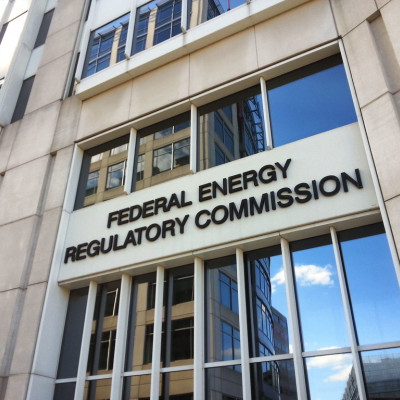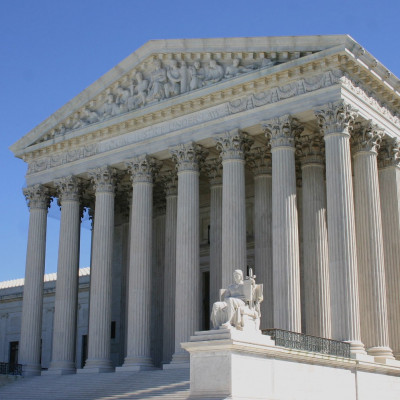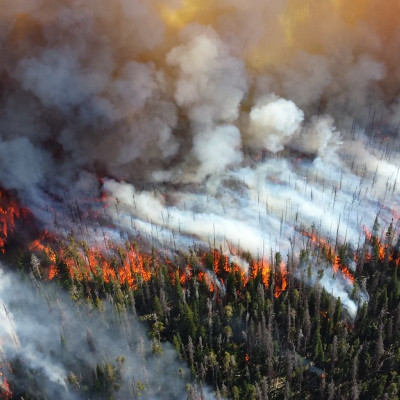May 31, 2024
May 2024 at Policy Integrity
- FERC Advocacy Pays Off in Landmark Transmission Rule
- Want to Help Grow the Environmental Justice Movement in New Jersey and New York?
- Agencies Have Authority – Even In a Post-Chevron World
- New York Cap-and-Invest: Here’s What Needs to Change
- 6/6 Webinar: Energy Disruptions and Resilience Research
- Energy Access and Equity – Webinar Recap
- Our Regulatory Policy Director Heads to OIRA
- More from This Month
-

FERC Advocacy Pays Off in Landmark Transmission Rule
In a major step forward for U.S. energy policy, the Federal Energy Regulatory Commission (FERC) recently issued its Order 1920 on long-term transmission planning and cost allocation. The rule, which aims to improve our often-shortsighted system for planning new electric transmission lines, could help to ensure that we have a more resilient, affordable, and reliable electric grid. It will do this by ensuring more holistic planning. Policy Integrity submitted four different comments to FERC at different stages of this rulemaking, and the Commission cited us multiple times. For example, it adopted our suggestion to require a set of mandatory benefit metrics in the evaluation of potential projects, citing our arguments about how doing so would facilitate the construction of interregional transmission because different regions would evaluate projects using similar methods. In the days surrounding the rule’s release, we also published a pair of blog posts providing contextual information on 1) the role that modeling should play in grid expansion planning and 2) why the Order does not trigger the major questions doctrine.
-

Want to Help Grow the Environmental Justice Movement in New Jersey and New York?
As part of the Thriving Communities Technical Assistance Center (TCTAC) led by WE ACT for Environmental Justice, Policy Integrity is helping organizations in EPA Region 2 access federal funding opportunities to advance environmental justice. To improve in-person outreach throughout New Jersey and New York, we are building a network of community outreach voices: WE ACT TCTAC Community Voices. Organizations participating in the WE ACT TCTAC Community Voices cohort will meet throughout the two-year partnership to determine regional priorities regarding environmental justice, climate justice, and energy justice, which will inform a Regional Environmental Justice Network in subsequent years of this project. TCTAC Community Voices will also receive equitable compensation for participation. We encourage you to learn more here and complete the WE ACT TCTAC Community Voices Application Form by 11:59 PM today, May 31, 2024. Please direct any TCTAC Community Voices Application questions to the WE ACT TCTAC team.
-

Agencies Have Authority – Even In a Post-Chevron World
The specter of imminent Supreme Court decisions in Loper Bright Enterprises v. Raimondo and Relentless, Inc. v. Department of Commerce looms large in the minds of regulators, legal scholars, and administrative law practitioners. With these two cases, the Court seems poised to strike down or severely weaken Chevron deference, a doctrine that instructs courts to defer to an agency’s reasonable interpretation of ambiguous statutory language. This doctrine has been relied upon in thousands of legal decisions concerning agency rules. Should Chevron deference be narrowed or eliminated, it could tee up challenges to certain existing regulations and limit the range of future regulatory actions. That said, our Dena Adler and Max Sarinsky argued in a recent commentary piece that agencies often have other avenues to adopt impactful rules—independent of Chevron deference. For example, some statutory provisions unambiguously grant agencies authority to act impactfully or provide agencies discretion to regulate on certain matters consistent with their expertise. Courts will also still have to defer to agencies’ reasonable interpretations of factual matters, such as conclusions about scientific evidence showing that a regulation is necessary.
-

New York Cap-and-Invest: Here’s What Needs to Change
New York's 2019 Climate Leadership and Community Protection Act set ambitious economy-wide greenhouse gas limits for the state, starting with 40% reductions below 1990 levels by 2030. To help reach them, the New York State Research and Development Authority (NYSERDA) and the New York State Department of Environmental Conservation (DEC) are developing a Cap-and-Invest program that aims to establish a declining cap on emissions in the state, sell emissions allowances to polluters, and invest the proceeds in programs that drive further emissions reductions. Earlier this month, Policy Integrity published a pair of blog posts about the program explaining 1) why Cap-and-Invest, as currently contemplated, won't achieve required emissions reductions without complementary programs, and 2) how the program can be designed to promote environmental justice. In the first post, our Elizabeth B. Stein and the Guarini Center’s Nathaniel R. Mattison argue that other state agencies must act immediately to deploy complementary programs in order to achieve the required emissions reductions. In the second post, our Michelle Fleurantin argues that DEC and NYSERDA should ensure that New York Cap-and-Invest can help disadvantaged communities by paying attention to what actually drives environmental burdens in these communities: co-pollutants.
-

6/6 Webinar: Energy Disruptions and Resilience Research
Climate change is increasing the frequency and severity of infrastructure-threatening weather events, including storms and wildfires, at a time when the grid itself is undergoing significant changes. These challenges require decisionmakers to understand the impacts of energy and infrastructure failures, how to mitigate them, and how to increase overall resilience. On June 6th, we will host a webinar featuring Dr. Duncan Callaway of the University of California, Berkeley, Dr. Mikhail Chester of Arizona State University, and Dr. Erica Fischer of Oregon State University who will discuss their ongoing projects in this area. We will also hear remarks from Leuwam Tesfai, the California Public Utility Commission’s Deputy Executive Director for Energy and Climate Policy, who will discuss her current work and her views on what kind of academic research is most helpful and necessary for policymakers. Click here for more information!
-

Energy Access and Equity – Webinar Recap
Our recent webinar brought together experts to discuss the distributional impacts of our changing energy system and how we can avoid placing disproportionate burdens on certain communities already bearing the brunt of harmful pollution and climate change. Dr. Jonathan Colmer, Dr. Anissa Dickerman, Dr. Diana Hernández, and Dr. Benjamin Sovacool explained how their research can help improve high-level decisionmaking by highlighting how the energy transition will affect supply chains, energy access, and the job market in different communities. Jon Binder, Deputy Commissioner for Climate Change, Air Resources, and Energy at the New York State Department of Environmental Conservation, also discussed how New York State is grappling with issues of energy equity in practice. He also emphasized the need for ongoing dialogue between policymakers, researchers, and local stakeholders to inform these critical decisions. All the panelists highlighted measurement challenges and gaps, such as the need to better capture lifecycle and community-level impacts, and they also stressed the importance of communicating research findings in a way that policymakers and communities can readily act upon. For more in-depth insights, view the webinar recording and read our blog post on key takeaways from the event. This webinar series is supported by the Alfred P. Sloan Foundation.
-

Our Regulatory Policy Director Heads to OIRA
Last week, Max Sarinsky – our regulatory policy director – began a leave of absence to serve as a senior advisor for the Office of Information and Regulatory Affairs. We wish Max the best in his new role, and we look forward to seeing all he is able to accomplish in this new role!
-
More from This Month
- Our founding director, Richard Revesz, and our regulatory policy director, Max Sarinsky, (both on leave at OIRA) published “Regulatory Antecedents and the Major Questions Doctrine” in the Georgetown Environmental Law Review.
- We published a policy brief that explains the social cost of greenhouse gases (SC-GHG) and EPA’s recently updated SC-GHG values for policymakers and practitioners.
- We submitted comments to DOT on an accessibility rule for air travelers with disabilities using wheelchairs and other assistive devices.
- We submitted comments to DOE on its notice of intent regarding launching a voluntary carbon dioxide removal purchasing challenge.
- We submitted comments to EPA in response to its request for input on reducing greenhouse gas emissions from existing fossil-fuel-fired stationary combustion turbines.
